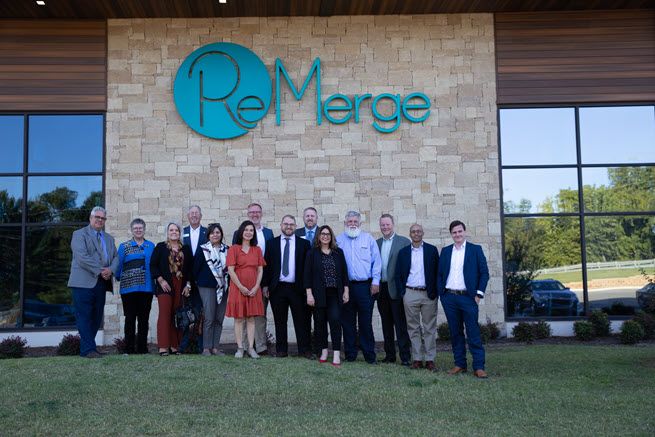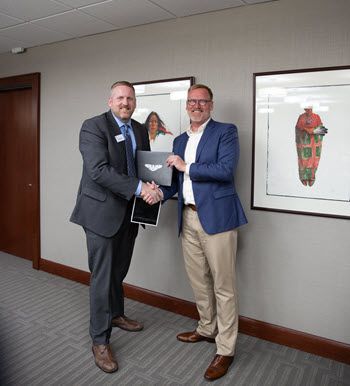The sunsetting of pandemic-related federal funding, along with inflation and the rising cost of housing, are causing financial strain for low- and moderate-income (LMI) households in the Federal Reserve Bank of Kansas City’s District. Members of the Bank’s External LinkCommunity Development Advisory Council (CDAC) offered their perceptions related to consumer financial conditions among LMI households at their October 10-11, 2023, meeting at the Oklahoma City branch office. Jeff Schmid, president of the Kansas City Fed, was on hand to listen and ask questions.
The CDAC is a source of partnerships and ideas for new focus areas and projects. Members offer deep knowledge of communities around the Tenth District and topics from education to workforce development, housing to entrepreneurship.
Members who shared information for the October meeting include:
- Aubrey Abbott Patterson, president and CEO, Hutchinson Community Foundation, Hutchinson, KS
- Monica Abeita, executive director, North Central New Mexico Economic Development District, Santa Fe, NM
- Michelle Bish, executive director, Northeast Workforce Development Board, Catoosa, OK
- Don Greenwell, president and executive director, The Builders’ Association, Kansas City, MO
- Scott Hoversland, executive director, Wyoming Community Development Authority, Casper, WY
- Quintin Hughes, Sr., program director, Northeast Oklahoma City Renaissance, Inc., Oklahoma City, OK
- Cindy Logsdon, executive director and CEO, Citizen Potawatomi Community Development Corporation, Shawnee, OK
- Jackie Loya-Torres, manager, CRA and community development, Commerce Bank, Kansas City, MO
- Awais Sufi, managing director, Yield Creative, LLC, Kansas City, MO
The Kansas City Fed asked council members what they were seeing in terms of LMI households’ financial stability through the end of the year and into 2024. What changes have you seen in LMI households’ financial security? How have you seen LMI households shifting their spending or means of payment, if at all, over the last few months? What changes have you seen for LMI workers’ wages over the last few months?

Community Development Advisory Council members and Kansas City Fed community development staff tour the headquarters of ReMerge Oklahoma County, a pre-trial diversion program that serves high-risk, high-needs mothers facing non-violent felony offenses.
Members noted that pandemic-related emergency subsidies and supports were winding down, causing difficulty for those who had relied on them.
- Jackie Loya-Torres, Kansas City, MO: “My community contacts fear that the reinstatement of student loan payments will push clients into delinquency in other areas of their financial lives. One said, ‘The reason so many of our clients experienced some financial calm over the past couple of years, was largely due to the COVID-related funding that kept them afloat. With those subsidies no longer available, we are seeing a greater demand than ever, on our already-limited resources. Some of our clients have no safety net in place.’”
- Quintin Hughes, Sr., Oklahoma City, OK: “As there were more resources, there seemed to be more undisciplined spending and that has come back to bite folks.”
- Aubrey Abbott Patterson, Hutchinson, KS: “During COVID-19, a program called KERA paid for rent and utilities for anyone who could prove they were experiencing financial hardship for up to 18 months. These funds abruptly stopped paying out as the pandemic ended. This has caused a massive disruption because there was a dependence and expectation that a household could rely on these funds; no additional resources or classes were offered to educate and help raise income in these households. Churches and our local Salvation Army are paying the cost for this.”
Nonprofits are facing much-increased demand for emergency services and other assistance.
- Jackie Loya-Torres, Kansas City, MO: “In my recent discussions with community partner organizations who serve LMI people and neighborhoods, I am told that their clients are increasingly in need of emergency assistance, including utilities, food, housing, clothing, and transportation. A combination of inflation-induced increases for all consumer goods, along with the sunsetting of pandemic-related emergency subsidies, has led to many people having to seek out emergency assistance from local non-profits, for the first time ever. This also has created a huge demand on these organizations.”
- Awais Sufi, Kansas City, MO: “LMI community requests for our services, particularly services providing food supplements and access to housing support, are increasing. Schools that serve low-income families are seeing greater requests from their families, which in turn has increased their requests to us to expand such services.”
- Michelle Bish, Catoosa, OK: “Many of our partner agencies serving LMI individuals have observed families moving in together to split the costs of bills and leaning on community agencies and others who can provide financial support. Post-COVID, many of these nonprofits have been carrying the weight of the financial stress from LMI families and resources are nearly exhausted with donations decreasing.”

Jeremy Hegle (right) thanks Geoff Jolley (left) for his service as a member of the Community Development Advisory Council.
Wages are not keeping up with the cost of living, and opportunities to advance to better-paying jobs are vanishing.
- Quintin Hughes, Sr., Oklahoma City, OK: “Financial security has decreased especially with loss of federal supports. I haven’t seen indications of job loss, just a matter of wages not matching the cost of living.”
- Cindy Logsdon, Shawnee, OK: “Financial security is weakening with the increased cost of everything. The use of payday lenders, pawn shops and credit cards are all on the rise just to make ends meet. Wages are not keeping up with the cost of living. Many are taking on a second job or a side hustle to close the gap. We are seeing more mental health issues, health issues due to financial strain and stress. I don’t see things getting any better in the next six months, only worsening.”
- Scott Hoversland, Casper, WY: “One partner reported back to me that the on-the-job training positions with any upward mobility ended with COVID. Families are now working multiple, lower wage jobs or giving up completely. LMI workers cannot get the needed training for upward mobility in today’s environment. There are a lot of hard-working people that are getting desperate. They are losing their housing, their jobs, their vehicles, and their children are losing their daycare or extracurricular activities.”
Insufficient supply and increasing demand for affordable housing is affecting economic development and people’s ability to live independently.
- Michelle Bish, Catoosa, OK: “We see more of a demand for housing and less inventory. Northeast Oklahoma has landed several large businesses that together expect to hire about 6,500 new employees but lack affordable housing needed to fill these positions. Housing has been an issue for years, but the problem is now compounded with the need to increase the workforce and with increasing interest rates. Affordable rental inventory is at a critical level and families are not able to afford to purchase homes due to high interest rates. Some LMI individuals have lost housing and are moving into hotels that rent by the week.”
- Monica Abeita, Santa Fe, NM: “We have a lot of multi-generational households in New Mexico. But one of our employees is having to move back in with her mom because her rent increased substantially, and she has a professional job. We are seeing a lot of public employers developing housing for their employees. Schools, transit agencies, counties, and cities are looking to develop their land for rental housing. They still need to solidify the funding piece, though.”
- Scott Hoversland, Casper, WY: “Rent in Jackson Hole has gone up about 60% in the last year. Staff at a food bank said a family came in saying they are spending 57% of their income on housing.”
- Don Greenwell, Kansas City, MO: “The LMI workforce in commercial construction are facing increased financial pressures from increasing credit card interest rates and housing costs.”
Some workers are seeing wages increase due to collective bargaining, bonuses or changes in hourly pay among national chains.
- Monica Abeita, Santa Fe, NM: “In New Mexico overall, there has been an awareness for the past year or so that the lowest paid workers need to be making at least $15 per hour. This is because chain fast food restaurants started raising their wages to this level.”
- Aubrey Abbott Patterson, Hutchinson, KS: “In our community, several companies offer sign-on bonuses for new employees. The unintended consequence is shifting workers from one company to another, not necessarily the growth of new employees entering the community. This causes low morale among the workers who stay.”
- Don Greenwell, Kansas City, MO: “For commercial construction, we have seen wage increases of 3.5%-5% for 2023 amongst collective bargaining agreements. With a number of projects in the Kansas City area at $500M+ (mega-project) range, demand for workers continues to be strong.”
